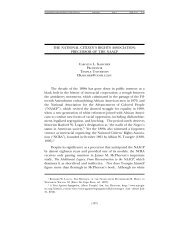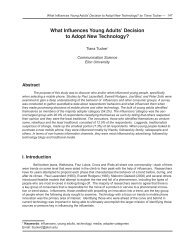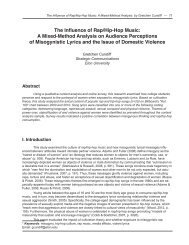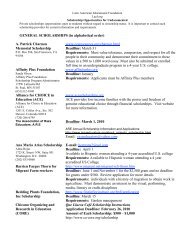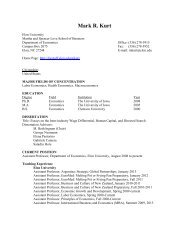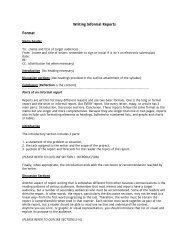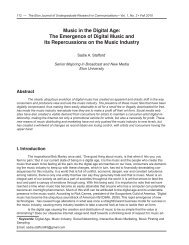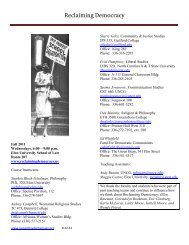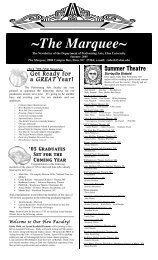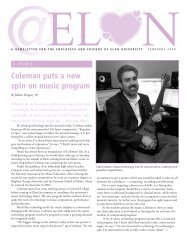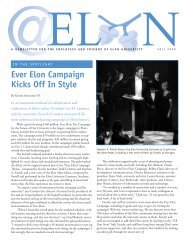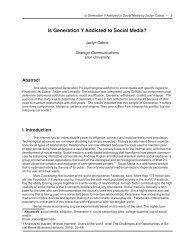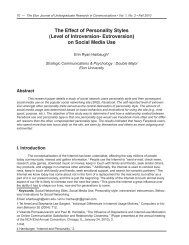In the Supreme Court of the United States In the Supreme Court of ...
In the Supreme Court of the United States In the Supreme Court of ...
In the Supreme Court of the United States In the Supreme Court of ...
Create successful ePaper yourself
Turn your PDF publications into a flip-book with our unique Google optimized e-Paper software.
1. Terry’s <strong>of</strong>ficer safety logic encompasses non-arrest protective sweeps because<br />
<strong>the</strong> Fourth Amendment’s reasonableness standard permits <strong>of</strong>ficers to take<br />
reasonable safety measures.<br />
<strong>In</strong> Terry, this <strong>Court</strong> held an <strong>of</strong>ficer’s need to perform a protective stop and frisk<br />
outweighed <strong>the</strong> Fourth Amendment intrusion on <strong>the</strong> individual. Id. at 24. A stop and frisk occurs<br />
when <strong>of</strong>ficers briefly search a suspect’s “outer clothing” for weapons to protect <strong>the</strong>mselves or<br />
“o<strong>the</strong>rs nearby.” Id. at 30. This <strong>Court</strong> allows <strong>the</strong>se limited searches, which are not subject to <strong>the</strong><br />
warrant requirement, as long as <strong>the</strong> <strong>of</strong>ficer has a reasonable suspicion <strong>of</strong> danger. Id.<br />
Fifteen years later, this <strong>Court</strong> expanded Terry’s safety rationale. <strong>In</strong> Michigan v. Long,<br />
this <strong>Court</strong> held that, under Terry, it is reasonable for an <strong>of</strong>ficer, without a warrant, to<br />
protectively search <strong>the</strong> passenger compartment <strong>of</strong> a vehicle. 463 U.S. at 1049–50 (quoting<br />
Terry, 392 U.S. at 27); see also Pennsylvania v. Mimms, 434 U.S. 106, 111 (1977)<br />
(“[I]nconvenience cannot prevail . . . against . . . concerns for <strong>the</strong> <strong>of</strong>ficer’s safety.”). <strong>In</strong> Long, as<br />
in Terry, this <strong>Court</strong> found that protecting safety outweighed <strong>the</strong> Fourth Amendment intrusion.<br />
Long, 463 U.S. at 1051. The Long <strong>Court</strong>, “[i]n a sense, . . . authorized a ‘frisk’ <strong>of</strong> an automobile<br />
for weapons.” Buie, 494 U.S. at 332. Terry’s logic, <strong>the</strong>refore, is broader than <strong>the</strong> protective stop<br />
and frisk, as interpreted in Long, and allows reasonable protective searches whenever <strong>of</strong>ficers<br />
objectively believe <strong>the</strong>y are in danger. Long, 463 U.S. at 1050 (quoting Terry, 392 U.S. at 27)<br />
(“[T]he issue is whe<strong>the</strong>r a reasonably prudent man in <strong>the</strong> circumstances would be warranted in<br />
<strong>the</strong> belief that his safety or that <strong>of</strong> o<strong>the</strong>rs was in danger.”).<br />
<strong>In</strong> Maryland v. Buie, this <strong>Court</strong> expanded Terry one step fur<strong>the</strong>r. Buie, 464 U.S. at 332–<br />
33. Under Buie, an <strong>of</strong>ficer may perform a protective sweep, or “a quick and limited search <strong>of</strong><br />
[<strong>the</strong>] premises, incident to an arrest, and conducted to protect <strong>the</strong> safety <strong>of</strong> police <strong>of</strong>ficers or<br />
o<strong>the</strong>rs.” Id. at 327, 337. Relying on Terry and Long, this <strong>Court</strong> again held <strong>the</strong> Fourth<br />
9



